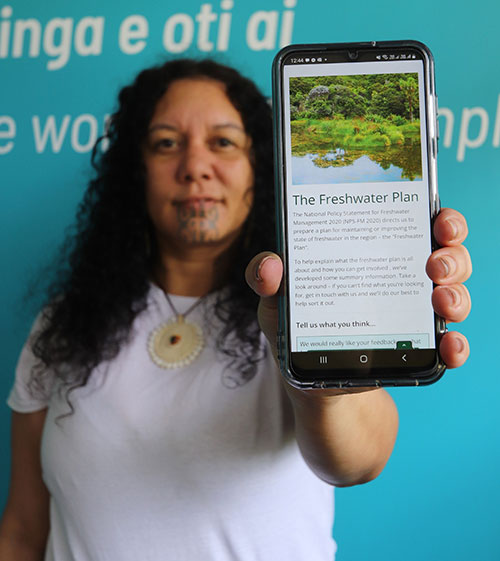Have your say on Northland’s Freshwater
25 Jan 2023, 9:11 AM
An online survey asking Northlanders to identify freshwater areas of importance to them, as well as what they think is affecting them, is a great way for people to get involved in the coming freshwater plan change says Northland Regional Council Chair Tui Shortland.
“We’ve been set a challenge by government to improve the health of our freshwater systems and the Freshwater Plan will be our new ‘rule book’ for how we treat freshwater in the future”, Chair Shortland said.
 Tui Shortland… online freshwater survey is a great way for people to get involved.
Tui Shortland… online freshwater survey is a great way for people to get involved.
Northland Regional Council (NRC) has been working with a range of groups to help with the preparation of the new plan but wants more input from members of the public before a draft plan is released for public feedback later this year.
“We want to know what people want to see improve, or what they think is good right now, when it comes to freshwater. The survey takes just a few minutes and it’s easy to find on the NRC homepage. You can drop a pin on a map to mark the spot you’re interested in, it’s actually quite fun to do”, Chair Shortland said.
People can also comment on any aspect regarding freshwater that is important to them by contacting NRC directly.
Chair Shortland said the environmental data collected and recorded by NRC showed there was a huge task ahead to meet new national minimum standards for freshwater quality as many of the streams, rivers and lakes in Te Taitokerau are in a poor state.
Approximately 95% of Northland rivers are graded poor or very poor for E. coli (a measure of faecal contamination from humans or animals) while 70% of rivers and streams are in poor condition for numbers of freshwater insects. Sediment is also a major contributing factor to poor water quality throughout the region and one which also has negative effects on harbours and estuaries.
All regional and district plans are required to give effect to the government’s National Policy Statement for Freshwater Management 2020 which sets the direction on how freshwater should be managed in New Zealand. Its fundamental concept is Te Mana o te Wai which specifies that when making decisions on any matter relevant to freshwater, councils must first prioritise the health and wellbeing of water bodies and freshwater ecosystems above the health needs for people (such as drinking water), and the ability of people and communities to provide for their social, economic, and cultural wellbeing, now and in the future.
